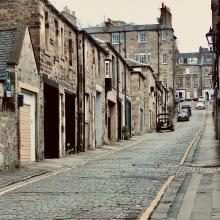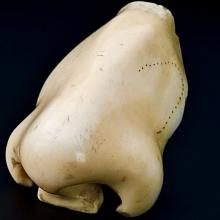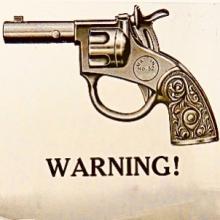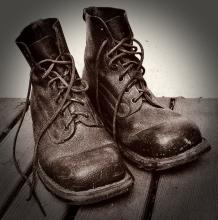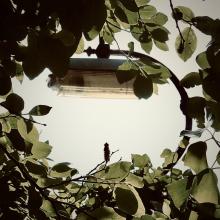
1873
SHOCKING TRAGEDY IN STOCKBRIDGE.
ALLEGED MURDER OF A CAB-DRIVER.
At the City Police Court this morning, before Bailie Wilson, John M’Laughlan, Bridget M’Gowan or M’Laughlan, his wife, John Hart, and Ann Dobie or Hart, his wife, all residing in Silver Mills, Stockbridge, were charged with the murder of Thomas Baird, on Saturday night.
The indictment set forth that the prisoners did with reaping hook or other sharp lethal instrument cut and wounded the said Thomas Baird on or near the left leg, to the effusion of blood, in consequence of which he was mortally injured and immediately thereafter died, and was thus murdered by the said accused, or one or more of them.
It appears that Hart, who is a labourer, and his wife resided in the top flat of a three-storey building in Silvermills Lane, and deceased and his wife lived in the flat underneath.[1] On the opposite side of the lane, M’Laughlan, who is a labourer, resided with his wife. For some time there has been a sort of feud between the parties, and frequent quarrels have arisen, the origin of which is attributed to quarrels among the children. On Saturday evening, between nine and ten o’clock, a quarrel took place between Mrs M’Laughlan and the wife of the deceased,[2] and the noise thus occasioned attracted Hart and his wife to the spot, accompanied by the prisoner M’Laughlan, and they took part in a sort of scuffle which ensued.
The deceased, Thomas Baird,[3] who was a cab-driver, arrived while the altercation was going on. His wife thereupon left him to take her part in the fray, with the intention of going to call in the aid of the police. All the persons engaged are said to have been more or less under the influence of drink, and after Mrs Baird left the Harts and M’Laughlans seemed to become more excited. Baird tried to settle the dispute, but was not successful. Mrs Hart, it is said, took hold of Baird, and Mr M’Lean, one of the neighbours, who was attracted to the scene of the scuffle, interfered and attempted to take her off, but she persisted in retaining her grasp. On a second attempt, however, he succeeded in causing her to release Baird, but she made another rush at him, and caught hold of him by the coat a second time, remarking that Baird’s wife had said she would put a knife into her husband (Hart) that night. Baird immediately after fell into the arms of Mr M’Lean. and on examination it was found that he had been struck in the hollow behind the left knee with a sharp weapon, which turns out to have been a reaping hook. Baird was never afterwards able to speak.
The report quickly spread that a man had been murdered, and medical aid was at once procured—a surgeon resident in the neighbourhood arriving on the spot almost immediately after the occurrence. It being quite dark, it was impossible to make an examination of Baird where he was lying motionless, and apparently without life. He was thereupon removed into a house entering from the lane.
The surgeon, finding the man to be quite dead, conjectured, from a report having been circulated that the deceased had been stabbed, that the fatal wound had been given in the breast and pierced into the heart; and it was only after examination that he found that Baird had been wounded as already stated. The weapon had penetrated into the bone, severing the leading blood-vessels of the leg, which allowed blood to flow so abundantly that Baird must have died a few minutes after receiving the blow.
An examination of the scene of the affray which was afterwards made showed that the loss of blood had been very profuse, a large pool having been formed. Information of the occurrence was forwarded to the Stockbridge Police Station, and the officials at the Main Office in High Street were at once communicated with. Detective Frew, who was then on duty, proceeded immediately to the scene of the murder.
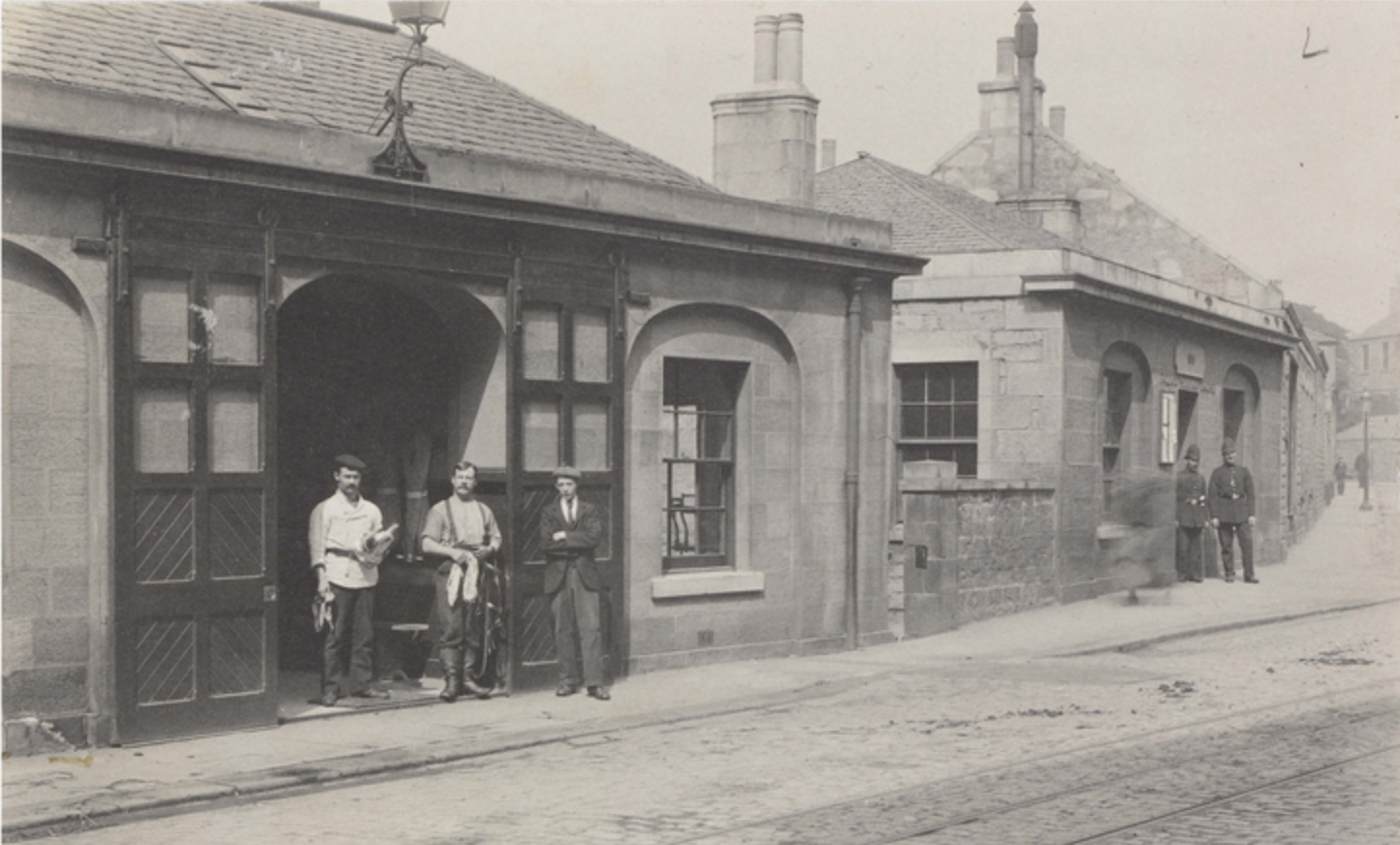
The inquiries made by him along with Police Sergeants Minty and Martin, with various constables, led to the arrest of the M’Lauchlans and the Harts. They were apprehended in their respective houses a little before eleven o’clock, within an hour after the murder had been reported to the police. Mrs Hart was in bed, and her husband was preparing to retire to rest, when the constables entered. Hart, on being told to accompany them to the Police Office, pretended ignorance of any cause for the request, and on being informed of what had occurred, and charged with having some concern in the matter he strongly protested his entire innocence. The M’Laughlans had not gone to bed, and when apprehended, also denied being implicated in the affair. The prisoners were removed to Stockbridge Police Station, followed by many of those who had assembled on a report of the affray being spread. The prisoners were subsequently taken to the Main Police Office under the charge of a large body of constables.
A search which was made in the neighbourhood led to the discovery of a harvest hook with which the wound was inflicted. It was found in the yard of a joiner immediately adjoining the place where the struggle had been going on, and it is supposed to have been thrown over there by the person who made the fatal stroke. The hook is covered with blood for eight or ten inches from the point of the blade, and as the instrument is somewhat blunt, the blow must have been given by the assailant with great force. It is stated that a hook, similar to the one found, had been seen in the possession the male prisoner Hart, and suspicion therefore attaches to him as the person who used it.
The body of Baird was removed to the Main Police Office, High Street, in the course of last night, with a view to a post-mortem examination by the surgeon of police. The prisoners were remitted from the Police Court to the Sheriff, and in the course of the afternoon they were examined before Sheriff Hamilton, and committed to prison for further examination.

LATEST PARTICULARS.
On making inquiry at the spot to-day, we learn from several of the neighbours who witnessed the quarrel, that the Bairds and M’Laughlans have been on bad terms for some time. The disputes began about the term,[4] at which time the M’Laughlans removed into the lane. Up to that time the place was a quiet one, the families all living on peaceful terms with one another. It would appear that the angry feelings first arose in regard to the children of the parties, and it became intensified ever since on Saturday nights, and especially on the side of the M’Laughlans.
The accounts concur in describing the unfortunate deceased as a quiet, inoffensive man, but he was heard on one occasion, having been roused into passion by annoyance from the outside, to use strong language as to what he would do in the case of his children being further interfered with.
On the other hand, M’Laughlan has been heard to use threats of violence against Baird, and it has been suspected by some of the neighbours that one or two Saturday nights he was lying in wait to do the latter mischief. However, so far as could be made out in the darkness, there is nothing to connect him directly with the murderous deed.
The origin of the row was due to Mrs M’Laughlan, who used very violent language on the stair leading to Baird’s house. Baird usually took no notice of such conduct, and though on Saturday night he came downstairs, he spoke calmly and seemed determined not to be drawn into a brawl. When Mrs M’Laughlan began the disturbance Mrs Baird at the instance of Mrs M’Lean, wife of Mr M’Lean above mentioned, went to fetch a policeman. In her absence Mrs M’Laughlan moved gradually away from the door towards her own house on the opposite side, and Baird followed her across the small court and into the lane, but not, it is believed, with any intention of restraining her, but for the purpose of looking for the return of his wife. It was then Mrs M’Laughlan seized him by the breast, and that M’Lean interposed.
M’Laughlan and Hart were present, the latter being a friend of the former, and it was then the fatal wound was given but by whom or in what manner could not of course be perceived in the darkness and confusion. The M’Laughlans and Hart, however, would appear to have been acting in concert, for it is distinctly stated that they disappeared to their houses and there was instant quietness after the deed was committed, before Baird gave any signs of being injured or the bystanders were aware that he had been hurt. He did not cry out on being struck.
The deceased was forty-seven years of age, and had lived thirty-two years in the house. It had been occupied by his father and mother who were greengrocers in Stockbridge. He succeeded to their business, and carried it on for some time, but it did not prosper under him, and he became a cab-driver with Mr John Playfair, in whose employment he has been steadily ever since, with the exception of about a fortnight, during which he was away on account of some little difference.[5]
Edinburgh Evening News, 18 August 1873
[Images: Fire and Police Stations, Hamilton Place, 1890. Edinburgh & Scottish Collection, Item 14851. Map: Ordnance Survey, 1849–53.]
[1] Hart is probably the same John Hart who died, aged 66 , at 480 Lawnmarket, on 5 May 1875. In SR Deaths 6685/4 332 he was described as a mason’s labourer and single. Dr Henry D. Littlejohn certified the cause of his death as ‘apparently heart disease’. He was the son of Anthony Hart (an agricultural labourer) and Mary Smith. I have found no record of his marriage to Ann Dobie in Scotland, or any other record of her here.
[2] 24-year-old Agnes Small (domestic servant), of 19 Ann Street, had married Thomas Baird (bachelor and greengrocer of Silvermills) at Dean Bank Lodge on 11 June 1861. They went on to have 5 children, 4 of them at Silver Mills Cottages and 1 at Haugh Street. In 1881 she worked as a charwoman and resided at 122 Causewayside with 4 of her children. In 1901 she was a 'Nurse Monthly' at 5 Braid Place. She died on 27 December 1911 in the City Hospital in Colinton, but her usual domicile was 77 Causewayside, where she lived in the household of her son David. She was the daughter of David Small (shoemaker) and Janet Pinkerton (SR Deaths 685/6 992). For additional research here and in Notes 3 and 5, thanks go to Caroline Gerard at Friends of Warriston Cemetery.
[3] In the Register of Corrected Entries, completed after his post-mortem, Agnes Small stated that Thomas Baird's parents were James Baird ('poulterer and fruiterer') and Agnes Christie. She gave the place of his death as Silver Mills House, although he almost certainly lived in what were known as Silver Mills Cottages. Thomas Baird was born around 1829 and lived with his parents and 4 siblings at Logie Green Lodge at the time of the 1841 Census. The family were resident in Silver Mills Cottage by 1861.
[4] Scottish term days for removals and hiring of servants were at this time—Candlemas (2 Feb); Whitsunday (15 May); Lammas (1 Aug) and Martinmass (11 Nov).
[5] Baird's employer was John Player, cab hirer at 23 Dundas Street and Tanfield. According to his children's birth records, Baird had been a grocer until at least 186 (at 18 Stockbridge Market 4 according to the Post Office Directory), and a cabman from at least 1866.
[6] Some atmospheric photographs of Silvermills Lane prior to redevelopment can be found on the Canmore website here.
*****
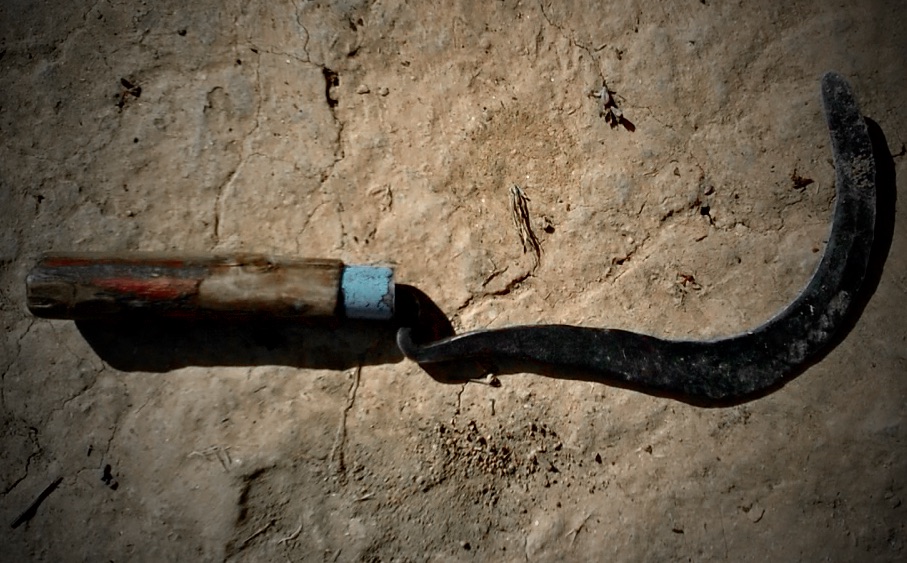
THE STOCKBRIDGE MURDER.
Yesterday, the Procurator-Fiscal was engaged examining witnesses in connection with the murder of Thomas Baird at Silvermills Lane on Saturday night. It understood that the evidence, so far as it goes, tends to criminate the old man Hart. He was formerly in the habit of going to the harvest. This accounts for his being in possession of the hook, which, it is alleged, a girl saw him throwing away immediately before the deceased fell.
The wife of Baird was one of the witnesses examined yesterday. The funeral of deceased is to take place this afternoon, the place of interment being Warriston Cemetery.
Edinburgh Evening News, 20 August 1873
[Image: Wikipedia, creative commons.]
******
THE STOCKBRIDGE MURDER.
John Hart, an old man, was charged with murder, committed at Silvermills, Stockbridge, on the 16th August. The indictment charged him with murder, in so far as he did wickedly and feloniously attack and assault Thomas Baird, cab driver, then residing in West Silvermills Lane, and did with reaping-hook or some other sharp instrument cut or stab him on the left leg, whereby Baird was mortally injured, and died immediately thereafter. The Solicitor-General and Mr Rutherford prosecuted, and the prisoner was defended by Mr Gibson.
James Hepburn said—I am clerk in the Sheriff-Clerk’s office, Edinburgh. The declaration produced was emitted by the prisoner.
Robert M’Lean said:—I was living in August last in West Silvermill’s Lane. The Lane runs from the foot of St Vincent Street to Henderson Row. I lived in a tenement on the right hand side. The house is set back from the line of the Lane, and there is a sort of court before it. Paton’s woodyard is immediately opposite. The house I lived in is three storeys high, and it contained several families. I knew the late Thomas Baird for many years. He was quiet and steady. I came home on Saturday night, 16th August, to my house about nine o’clock. My wife came with me.
A short time after I heard a squabbling, outside. I heard Mrs M’Lachlan calling up to the Bairds’ windows. I went to the door, when one of Mrs Baird’s little girls came out and asked if I would keep a look out for her father, who had gone to the barber’s. Her mother was afraid of him.[7] Mrs Hart came downstairs at the time, followed by her husband. I said it was a nice night, and the prisoner stood and spoke to me. Thos. Baird came downstairs at the time.[8] The prisoner then went away towards Henderson Row. Baird afterwards went up to his own house. That was about ten o’clock.
A short time after I heard Mrs M’Lachlan’s voice in the passage. I could not say what she was saying. The sound appeared to go upstairs, and at the top flat there was loud quarrelling. I went out and found Baird standing at the doorway. Mrs Baird came downstairs and asked him (Baird) if he would stand there and see a man and woman abuse his wife? She said she was going for a policeman and went towards Henderson Row. Mr M’Lachlan afterwards came downstairs. I don’t know what they were quarrelling about. I heard something about a dress being stolen. Baird and M’Lachlan spoke to each other, and the quarrelling was resumed. M’Lachlan endeavoured to get his wife back into the house.
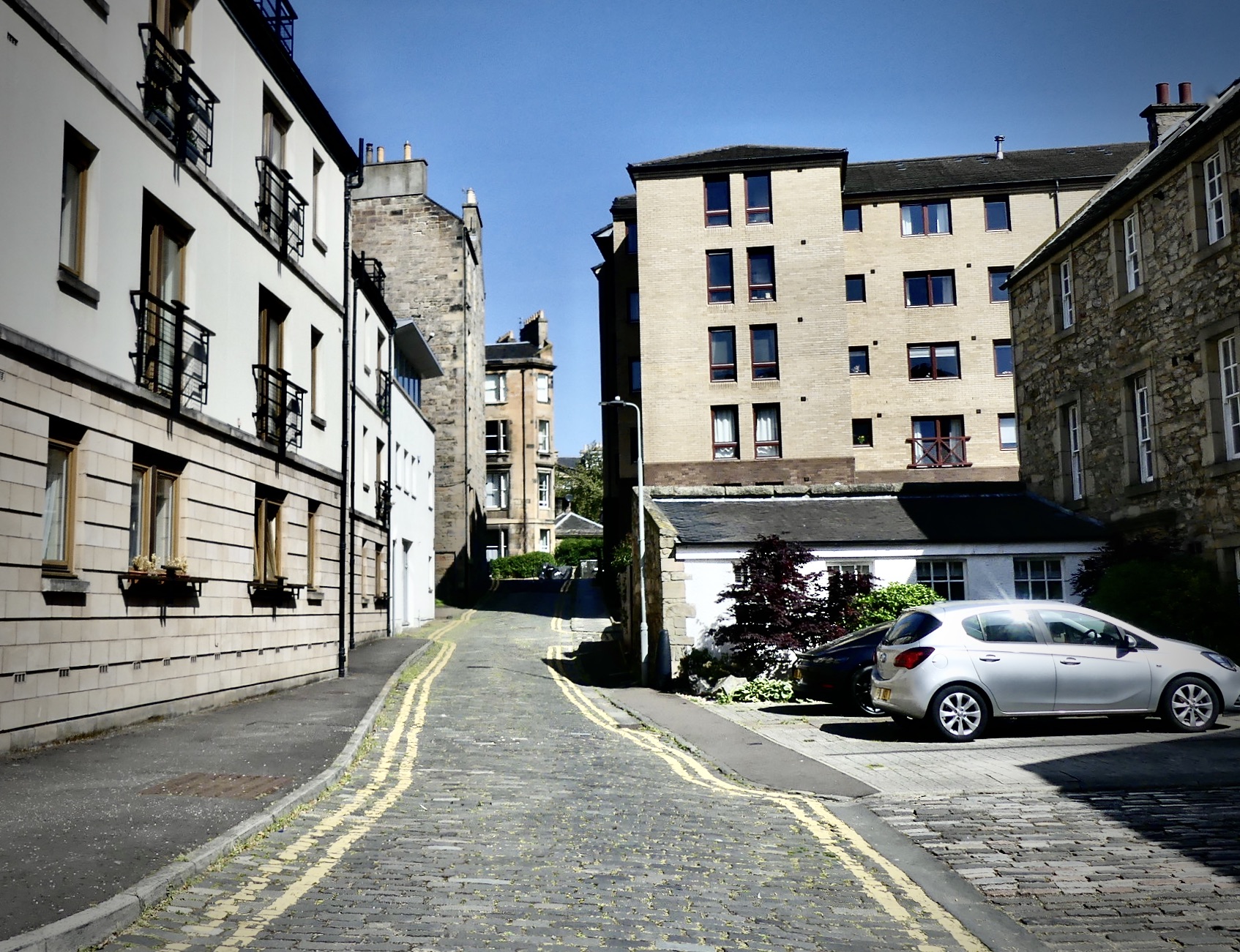
Baird went forward in the Lane and looked in the direction in which his wife had gone; I saw him standing there. I saw Mrs Hart and her husband coming down the Lane from the direction of Henderson Row. Mrs Hart caught Baird by the coat and exclaimed something. I went forward and took her away, but she caught him a second time. I took her away again and was going to take Baird back to the house when he fell upon me with his whole weight. Mrs Hart said something when she took hold of Baird, but I don’t know exactly what she said. She said, “they had threatened to put a knife in my John to-night.” I understood that she referred to the Bairds.
When I released the deceased from Mrs Hart, the second time the prisoner was standing behind her. The M’Lachlans were standing about half a dozen yards off. When the deceased fell upon me I thought he had fainted. He did not utter any cry. I dragged him across the strand to his own house, and then I saw that he was bleeding. My wife brought light, and sent for a doctor. I left the deceased in charge of a man named Anderson, and went for a policeman.
I was away for about three minutes, and when I returned I found the deceased in my house, and a doctor attending him. He was then dead. I examined the place where Baird fell into my arms about half an-hour afterwards. I found a pool of blood, and there were marks of blood on the ground from there to my door. Next morning I saw spots of blood on the door of the woodyard opposite my house. I don’t think Mrs Hart could have wounded the deceased, from the way she had a hold of him. I did not see the prisoner do anything.
The Solicitor-General—Was he within reach of injuring the deceased?—Yes, he was immediately behind his wife.
Was there anybody else within reach ?—No, not that I saw.
Cross-examined by Mr Gibson—He did not notice anything in Hart’s hand when Mrs Hart introduced her husband to witness.
In reply to the Court, the witness said Mrs Hart made the accusation of the stealing, and he understood she blamed Mrs Baird.
Mrs McLean, wife of the previous witness, said—l remember the 16th August last. I came home with my husband about nine o’clock. I went out some time afterwards, and the prisoner and my husband were in conversation at the door. I went in again, and was followed by my husband. Just before he came in I heard him speaking to the deceased. I heard Mrs M’Lachlan making some noise upstairs.
We went to the door and found Baird standing at it. His wife came downstairs and appeared angry. She asked her husband if he would allow people to strike her on the stair. She went away and the M’Lachlans then came downstairs. M’Lachlan spoke to Baird. Baird said, I am not speaking to you. M’Lachlan was trying to get his wife home.
During that time Baird went out to the street and the prisoner and his wife came down the Lane about the same time. I did not see Mrs Hart do anything. I saw husband go forward to where Baird was. I heard my husband cry “Let go!”
Mrs Hart then had hold of Baird. She had nothing in her hand. I heard her say “She would put a knife into my John to-night.” I understood she referred to Mrs Baird. I took Mrs Baird’s hand off Mrs Hart’s shoulder, and got hold of Baird. They were separated. The prisoner at his wife’s side. I did not see anything in his hand. My husband tried to pull back Baird.
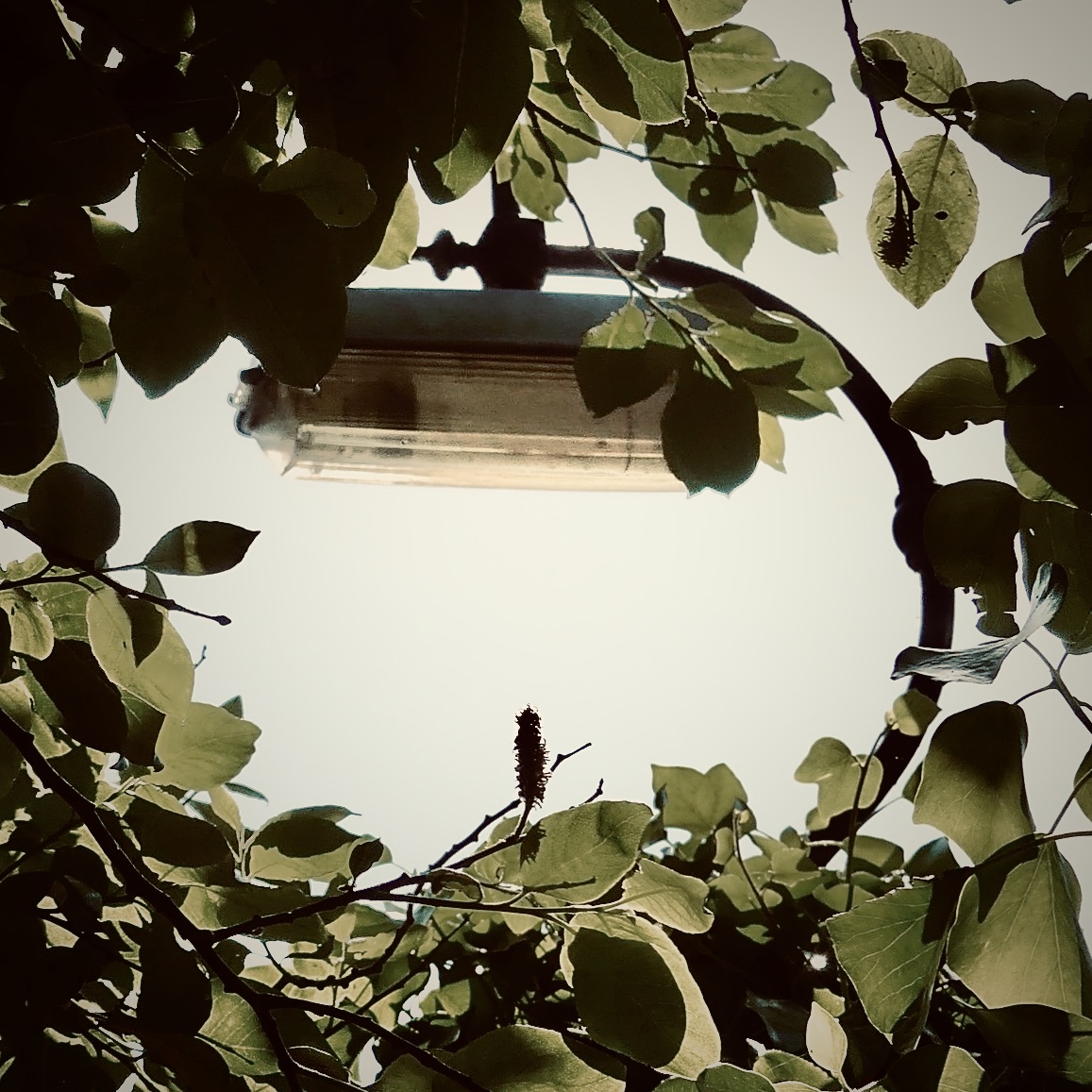
The Solicitor-General—Was there any one there who could have injured Baird but the prisoner?—No.
Why?—Because Mrs Hart and my husband had hold of the prisoner. The M’Lachlans were some distance off. There was no person there except my husband, myself, and Hart and his wife. I thought Baird had fainted when I saw him in my husband’s arms. When I saw him in that position they were crossing the strand. The prisoner walked away when my husband had Baird in his arms, and went into the house. There was no light at all when this was going on. The gas was not lighted. Baird was taken into our house, where he died. The doctor and police came shortly afterwards. Mrs Baird did not return till after it was found her husband was wounded.
Cross-examined by Mr Gibson—The quarrelling with the M’Lachlans and Baird went on for about an hour. Mrs M’Lachlan said Baird was a whore master several times. The M’Lachlans, the Harts, and several other people were in the lane.
By Lord Ardmillan—She knew Mrs Hart well, but she did not know whether she was right or left handed.
Mrs Gaylor said—l live in Silvermills Lane. I remember the 16th August when Mrs M’Lachlan was making some noise. I saw the deceased come home about twenty minutes past nine. I lived in the first landing of the house, and he passed up to his own house. Mrs Baird opened the door to him, and she asked him if he had seen Annie’s gown on the stair. He said no, roughly, and went in. I heard the M’Lachlans go upstairs to the Baird’s landing.
Mrs Baird and Mrs M’Lachlan had some words. I heard Mr M’Lachlan say, “Hold hands off my wife.” They all went downstairs after that, and the M’Lachlans went out. Shortly afterwards I heard Hart’s voice. He was speaking to Thomas Baird. I did not hear or see the M’Leans. I did not hear all the conversation between Hart and Baird, but the latter said twice that the former was an old man. Hart replied, “I never stole a gown.” Baird said, “Neither did I.” Hart answered, “You stole my Annie’s gown.”
Shortly afterwards I heard the prisoner’s wife in the court opposite the house call out, “John, my God, what are you doing?” The Harts came upstairs immediately afterwards, and I looked out and saw one man sitting on the ground and another leaning against him. I heard McLean call out for a doctor. I heard a few minutes afterwards that Thomas Baird was dead.
Cross-examined by Mr Gibson—Before I heard Baird coming in there was a row. I heard Hart and his wife coming in before Baird. Hart said “come away, Annie; if they stab you they will stab me.” That was about nine o’clock. I heard Mrs M’Lachlan at Mr Baird’s door. Mrs Baird said, “Don’t speak to me, I have nothing to say to you.” I had seen deceased going up and down stairs, but I did not know him. He seemed a quiet man.
By the Court—l had heard the Bairds and M’Lachlans quarrelling once before. I understand a gown had been stolen from Mrs Hart, but I don’t know what Mrs M’Lachlan had to do with it.
Mrs Peters—l am the mother of Robert McLean. I was visiting him in Silvermills Lane on the 16th August. I remember hearing a scuffle outside the house about ten o’clock. My son and wife went outside, and stayed at the door. I heard a number of voices, but could not recognise them distinctly. The prisoner passed in and went upstairs. When opposite the door he said, “I’ll be hanged for yees all yet.” I do not know if the prisoner noticed me. I immediately heard my son call for a light. His wife came in for one, and when she went out I heard that Baird had been injured. This witness was not cross-examined.
Mrs Margaret Forsyth said—l live in Silvermills. My house is on the ground flat. On the night of the 16th August, while in bed, I heard the prisoner come up stairs. That would be about ten. He was running, and she said to her little girl that there was surely something wrong with John, as usually he could hardly go upstairs at all. As he passed he said “O, my soul. O, my soul.”
Mrs M. Stuart said—I live in Silvermills, and I remember the 16th Aug. There was a good deal of noise that night in the street about ten o’clock. Mrs McLean came in and told me Thomas Baird had been injured. Before that a short time I heard the prisoner and his wife going upstairs. Mrs Hart said, “Where is the hook, John?” but I did not know what she meant. John made no answer.
Cross-examined—I live on the top flat. I was at my door when I heard this.
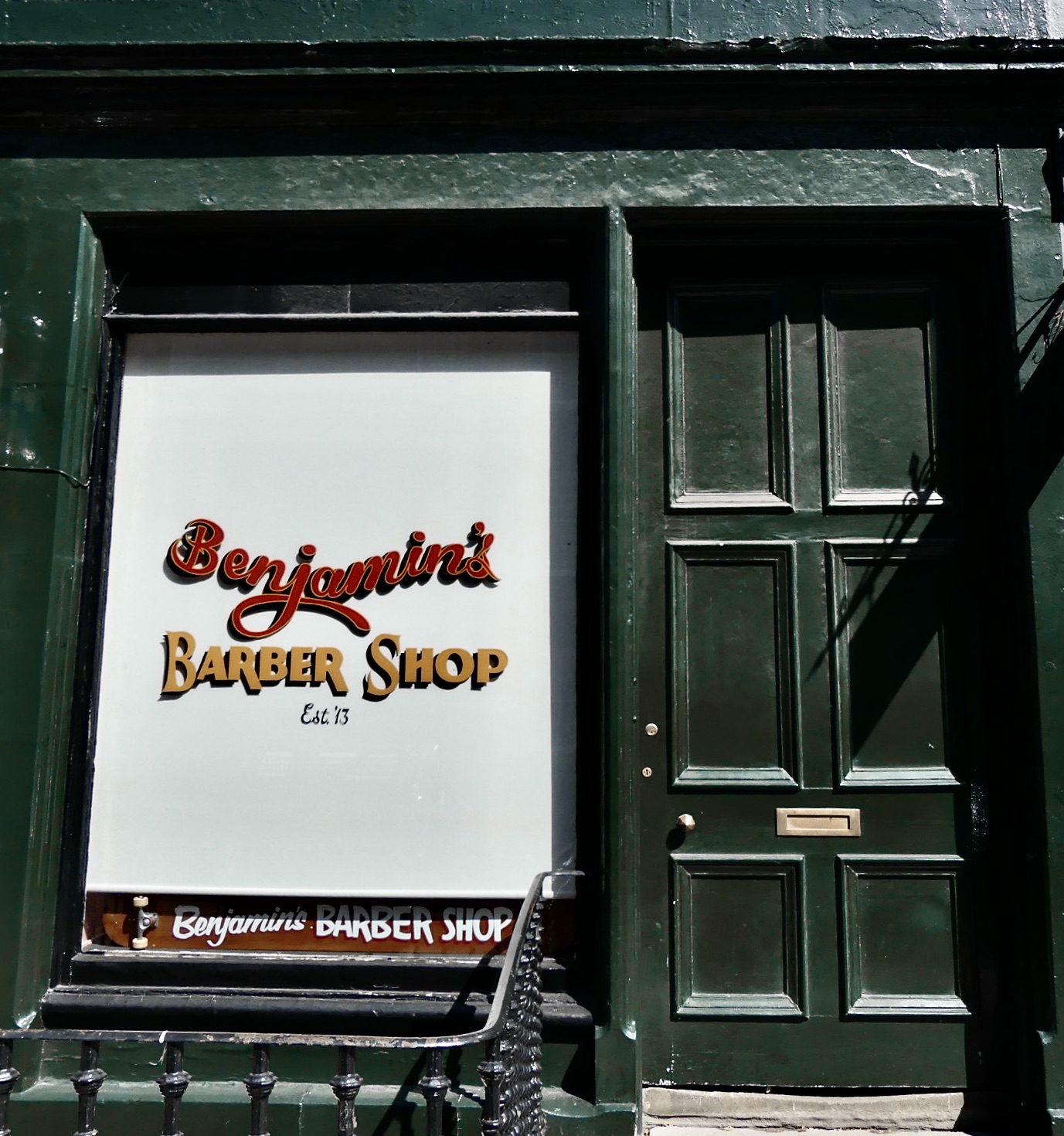
Catherine Jones said—l am 14 years of age, and live with my father, who is painter, in Silvermills Lane. I went a message between nine and ten o’clock on the 16th August, to Mr Church’s, the grocer’s.[9] I know the house where the prisoner’s house is, and passed it. I saw some people standing opposite the woodyard. The prisoner was among them, and was near the gate of the woodyard. I saw him throw something over the fence, but what it was I could not say. I just passed him as I saw him throw it over.
Cross-examined—This was between nine and ten o’clock. She went to the shop and when she returned in about twenty minutes she heard Thomas Baird was dead.
Jessie Jones, sister of the last witness, said—I remember being sent out with my sister to Mr Church’s. I know the woodyard in Silvermills Lane. When I was passing it I saw John Hart, the prisoner, fling a hook over the fence. I did not observe where the prisoner went afterwards. I was nearer John Hart than my sister when I saw this.
Cross-examined by Mr Gibson—There were other people there at the time. The prisoner’s back was to me. I went to the grocer’s shop with my sister. Mrs Simpson was the first person I told about the hook. I told her the same night. I said nothing about it to her sister at the time.
John M’Lachlan said—l lived in Silvermills Lane in August last. My house is opposite where the prisoner resides. I came home on the night of the 16th August, between nine and ten. My wife was at home. She went out about ten minutes after, and I went with her. We went to see Mrs Croal, who lived in the same flat with Thomas Baird. We stayed there about four minutes, and went home again. She went out again about ten for the bairns. I did not then hear my wife’s voice in the lane. There was no disturbance between my wife and Mrs Baird that night. I saw Baird in the lane about ten o’clock. Thomas McLean was there. He did not see the prisoner and his wife there. I am quite sure I had no words with Baird that night, nor did I injure him in any way.
Cross-examined by Mr Gibson—He did not hear his wife calling out Mrs Baird’s name that night, nor any one else. Baird did not say to him “I have nothing to say to you” that night.
Were you not shoving and pulling your wife to go into the house that night ?—No; she had her hand in my coat pocket all the time. (Laughter.)
How long was it from the time you left your house till you returned ?—Well, I think about ten minutes. And she had her hand in your pocket the whole of the time ?—Yes; she is woman that has not very good sight, and she put her hand in my pocket to guide her.
You were apprehended on the charge of murdering Baird?—Yes.
Mr Rutherford—And you were set at liberty?—And so I should, sir.
Mrs M’Lachlan, wife of the last witness, said she went with her husband to Mrs Croall’s house on the 16th August. She did not see either Mr or Mrs Baird. Mrs Simpson came to her door and told her Baird was killed. She had no hand in hurting him.
Cross-examined by Mr Gibson—She was sure she had her hand in her husband’s pocket when she went into the stair. She did not kick Mrs Baird’s door, nor kick nor knock at it. Neither did she see Baird. When her husband and herself came downstairs they went straight to their own house. Her husband might have pushed her towards her own house. She had been apprehended along with her husband.
Mrs Baird said—l am the widow of the late Thomas Baird. On the 16th I was at home when he came. There was a disturbance in the stair made by Mrs M’Lachlan. I went for the police, and when I came back I found my husband was dead.
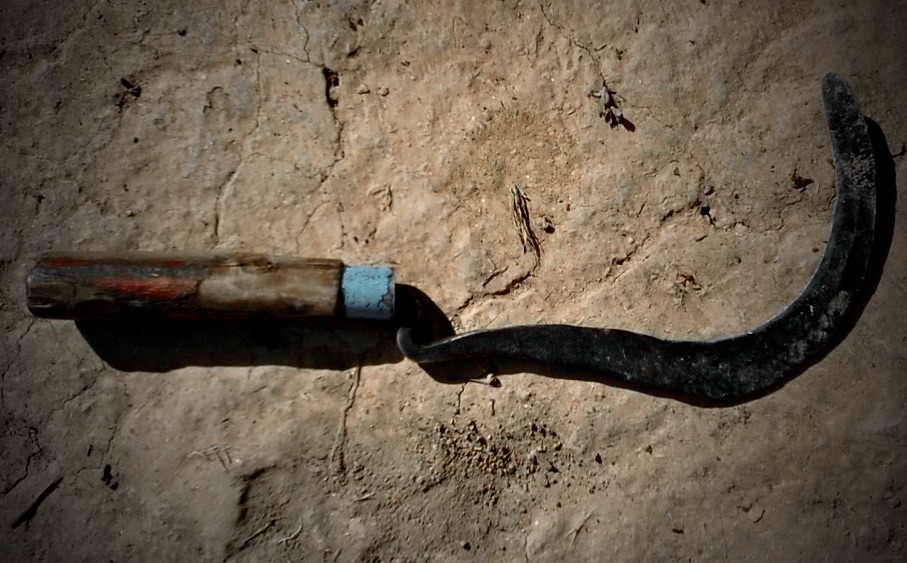
James Minty said—l am a sergeant in the City Police. About twelve minutes past ten I went to Silvermills Lane, having been called from the police station by Mrs Baird. Another constable told me while on the way that there was a man dead. I found the body of Thomas Baird in M’Lean’s house. Baird was quite dead. I went to prisoner’s house afterwards. He was undressing, and his wife was going to bed. I charged him with stabbing Thomas Baird. He said, “Come away, I am glad to see you. I never harmed any one.” I took him to the Police Office, after which I returned and searched the lane. I noticed a track of blood towards the common stair of the house where the prisoner lived. Sergeant Martin and Constable Riley were in the woodyard when I returned. They returned bringing a hook (produced) with them. There was a good deal of blood on the hook. I did not see where the hook was found. After daylight I went back to examine the place. There was a pool of blood in the centre of the lane, and on the fence of the woodyard there were small spots. When I apprehended Hart he was quite cool and collected, but bringing him to the station I observed that he had the appearance of drink.
Cross-examined by Mr Gibson—His wife was apprehended likewise.
Michael Reilly said—l am a constable in the Edinburgh City Police. On Saturday 16th August I heard of the death of Thomas Baird. I got down to Silvermills about eleven, and found the body in the witness M’Lean’s house. I made search in the woodyard opposite where the scuffle took place, and found a hook eight or nine yards from the paling. There was blood some four inches from the point. I was satisfied that it had made the wound when I found it. The girls Jones pointed out the place where they saw the prisoner throw the hook over the fence. It was exactly opposite where I found the hook. Mr James Ormiston Affleck said he was a Doctor of Medicine, and had been called to see the deceased, whom he found quite dead. On examination he found a large cut at the back of the left leg, below the knee. The body was removed to the Police Office where, Dr Littlejohn[10] examined it. The cause of death was haemorrhage, the result of the wound on the leg.
The Solicitor-General—Look at that hook. Is that such an instrument as would produce the wound? It is quite capable of producing the wound.
Would the use of that be likely to produce the wound you saw?—Very likely.
How long would it be after the wound was inflicted before it would have any effect on the deceased?—Almost instantaneously.
Dr Littlejohn corroborated generally Dr Affleck’s’ evidence, and said the wound would have an immediate effect, and would manifest itself by sudden faintness.
The prisoner’s declaration was then read. In it he said he was drunk, and did not know whether or not he struck the deceased. The hook was not his. He could not say whether or not he had it in his hands on the 16th August.
This concluded the evidence for the prosecution. In the defence, the following witnesses were called:—
William Blake said—l am an assistant to Mr Church, a grocer in Claremont Place. I remember the prisoner’s wife being in the shop about a quarter-past ten on the 16th August. I saw one of the girls Jones there at the same time.
The Solicitor-General—How do you remember they were there at the same time ?—My impression is I saw them there together. There were many people in the shop.
James Webster said he was a watchmaker in Salisbury Street. He had known the [prisoner] for a long time, and always thought him a very quiet and inoffensive person.
The Solicitor-General, in addressing the jury, said the question for them to decide was who struck the fatal blow? The only two possible persons who could have injured Baird were the prisoner and his wife, and after the evidence which had been given he presumed it would hardly be suggested it was the latter.
The only other person that could, do it was the prisoner. They must remember that his wife called out, at the only time when the wound could be inflicted, “My God, John, what are you doing?” that she asked, as she followed him upstairs, where the hook is, and received no answer, and that the hook which must have inflicted the injury, was found where the girls said it was thrown.
He submitted that it was the duty of the jury on the evidence he had brought forward to find the prisoner guilty.
Mr Gibson, in addressing the jury on behalf of the prisoner, said the learned Solicitor-General had asked them to come to the conclusion that the possibility of the M’Lachlans or Mrs Hart inflicting the blow must be excluded. He hoped they would not adopt that opinion. The lane was a dark one. There was a lamp in it, but it was not lighted. If the witness, M’Lean’s attention, or his wife’s, had been diverted for a moment, it was quite possible that the M’Lachlans might have come forward and dealt the fatal blow, or even Mrs Hart might have done it, although God forbid that he should suggest she had done so.
He asked them to discredit entirely the story of the two little girls. Their evidence was negatived entirely by the M’Leans, who said that immediately Baird fell the prisoner went into the house. He could not, therefore, have gone and thrown the hook over the fence.[11]
He submitted that the weight of the evidence was in the prisoner’s favour, but even if they should think he had struck the blow he asked them to reduce the charge to one of manslaughter, on the ground that there had been no premeditation, or intention to inflict a deadly blow.
The Lord Justice-Clerk, in summing up, said that if the evidence given by the little girls was considered by the Jury to prove that, on the night and at the time stated, the prisoner threw away a hook, where the weapon in Court was found, that, taken in connection with the other evidence, was sufficient proof that the prisoner, and the prisoner alone, had committed the crime.
The jury retired a few minutes past four o’clock, and after being absent for about 20 minutes, returned, by a majority, a verdict of not proven. The prisoner was accordingly dismissed from the bar.
Edinburgh Evening News, 14 October 1873
[7] Mrs Baird was afraid for her husband.
[8] Presumably, Baird came down from St Vincent St.
[9] The premises of James Church, grocer, were at 8 Claremont Place – now Benjamin's Barber Shop on Henderson Row.
[10] See News from the Mews 12, Note 8.
[11] The problem with this argument is that Baird did not collapse immediately after the wound was inflicted. So there was indeed time for Hart to have disposed of the weapon.
